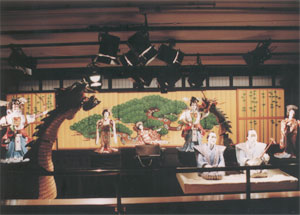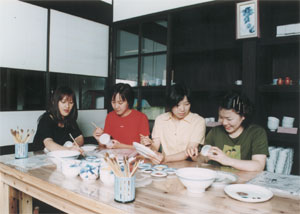
THE TOWN
Every year, Arita holds a townwide ceramics fair all through Golden Week, a cluster of national holidays
lasting from April 29 to May 5.
|
||||||
|
Walking Around Town
Arita is located to the west of Saga City, Saga Prefecture, which is on the island of Kyushu. It has a population of 13,500 and an area of only 27.09 square kilometers. Although it's a tiny town, it's renowned for the porcelain it produces. The town spreads across hills that are between 300 meters and 600 meters above sea level, and about 70% of the town is wooded. Arita River, which runs between the hills, flows through the center of the town and out into Imari Bay. Arita is so small that a bicycle ride will easily take you through the whole town. By visiting the many potteries, museums, and shops in the town, tourists can come in touch with the history of Arita ware. In this section we introduce some of the highlights of the town.
(1) Sueyama Shrine
Sueyama Shrine is very typical of Arita, having a torii gate and komainu (guardian dogs) made of porcelain.
The gate and statues are normally made of stone, and this is probably the only place in all of Japan where
you can see porcelain ones. The good-luck charms that visitors can buy at the shrine are also made of
porcelain; they're very popular as souvenirs.
(2) Arita Ceramic Art Museum
The Arita Ceramic Art Museum exhibits pieces of Arita ware from the early days of porcelain production
in Japan in the early seventeenth century up to the modern day. Although it's a small museum, visitors
can see many masterpieces here. Among them is the famous dish known as the "platter with a blue underglaze
painting of Arita ware artisans."
(3) Tonbai walls
Tonbai refers to the fire-resistant bricks used to build
kilns known as noborigama (stepped kilns built on slopes), and tonbai walls
are built by gathering fragments of used tonbai and cementing them with mud. Even today, although concrete
is commonly used to make walls, there are many tonbai walls in Arita. Some
are very old, while others have only recently been made. After all these centuries, tonbai
walls continue to be a part of life in Arita.
(4) Akaeza
If you want to try painting your own designs on a piece of Arita ware, Akaeza is the place to go. Here,
you can choose from five colors to paint whatever you like on glaze-fired pieces of white porcelain. The
workshop will then fire your piece again and send it to you after it's been completed.
| ||||||
|
© Town of Arita
|
||||||

